外研版必修3Module5学案
外研社必修三Module5教案电子教案.docx

外研社必修三Mod ul e5 教案科目Teaching ContentTeaching Objectives学习—————好资料Teaching Plan英语年级高一教师许宝玉Book 3 : Module 5 Great People and Great Inventions of Ancient China( Reading and Vocabulary)1. Knowledge aims:(1)To help students understand the words and some useful expressions(2)To get the students have a better understanding of the text( 3)To train the students’ ability of guess words’ meaning by read the sentence (4)Learn to introduce a great person from some aspects---names and thoughts2. Language ability aims:Theoretical basis: High school English curriculum standards emphasize the ability toacquire and process information in English1). Can get the main information from the article and extract the main points2). Can understand the subject of the article, the author's intention3). Can extract, filter and reorganize the information in the article4). Can use the context to guess new words(1)Learn to read with some reading strategies(2) Improve students ’ integrated abilitiesspeakingof and reading(3)Learn to introduce a great philosopher.3.Learning strategy aims:Vocabulary classificationEffective self-regulation during reading, English interaction, and task completion. Obtain relevant information through various channels, identify and apply effective resources.4.Cultural awareness and emotional attitude:To get the students learn more about the great people and great inventions of ancientChina 5. Teaching important points1.Know the pronunciations of new words. For the students, know the pronunciations of the words are really important. Only if they know them clearly, can they understand the words exactly.2. Talk about the great people and great inventions of ancient China. Get the general information about the great people, such as Confucius, Mozi and Mencius.学习—————好资料Teaching Material and Students Analysis 6. Teaching Difficult Points1.How to describe a great person. Description is difficult for the students; the teacher shouldguide them to introduce the person from some aspects. For example, the teacher can ask the students to describe the person from these aspects: names, birthplace,and thoughts.2.Let the students understand the passage better and let them grasp key words and phrases.The content of my lesson is Module 5 in New Standard English Book 3. This module is aboutthe Great People and Great Inventions of Ancient China. It introduces three famous people inChina. They are Confucius, Mozi and Mencius. By studying of this unit, we ’ ll enable students to know more about the great people and great inventions in ancient China. At the same time,let the students learn how to describe a person. Students in grade one in senior high school. /Average class/ They haven ’ t completely changed their smethodofstudying and cannotinvolve themselves in the class activities fully. They have difficulty in expressing themselvesin English clearly. Some students are not very interested in English.Teaching Aid Teaching ProcedureLead –in Pre-reading Blackboard; A recorder; Computer; A projectorThe teacher’ s activityShow Ss some pictures of great people in China and in theworld and ask them who is your most admired or respectedgreat people of China ?Task 1:Complete the gaps with the words in the box onpage41.Then ask individuals to show their answers.equal philosopher thinker treat state rulerphilosophy teachings war look afterTask 2:Q1: Do you know any philosopher of ancient China?Guess the people by what they said.Q2: Look at the pictures and answer thefollowingquestions.The students’purposeactivityStudents need to havLead ina brain-storm and 3minsspeakloudly.The students8minsdivide Strengthenthemselves into basisgroups andwork togetherand give out theanswers.Ss can have avivid and afurtherunderstanding学习—————好资料Who is he? What was his main idea?of the personPre-and keep their learninginterest inlearning.Task 3:While –reading Read these statements and tick the ideas that Confuciustaught.Skimming:Task 1:Ss should read the material fast to find the words andphrases in the passage that match these definitions. Task 2:Ask students to read the passage as quickly as they can,then read questions on the screen and choose the correctanswers.Students readthe sentencesand make achoice.The studentsread the 25minspassagecarefully andgive out theanswers.Scanning:Task 1. (Individual work)Ask Ss to read the three parts carefully and fill in theblanks. And teacher will check the answers.DeeperlearningThe studentsfinish the taskcarefully anddiscuss witheach other, andthen share theideas.学习—————好资料Task 2. (Individual work )Ask Ss to read the the passage again and decide if these following sentences are true or false.1.Confucius lived in a country where there was no wara long time ago.2.Confucius was a philosopher whose influence has been the greatest for more than 2000 years.3.Mencius was a student taught by Confucius.4.Some rulers followed the advice which was given by Mencius.5.Mozi was a man who lived an unusual life.Task 3. ( Group work)Ask Ss to read the the sentences carefully and try to translate them into Chinese. They can finish it in the form of group.Summary The studentsread the Improve passage and the Reading questions again Skillsandfinish the taskon their own.consolidationTask 1: Discussion these questions.Which of the following opinions do you think is the mostimportant? And why?(1)All men are equal.Post- reading(2)Kindness and love.(3)Peace.Task 2:Peace is quite important. Peace and development are thetwo subjects of our modern world. In history, wars haveLinkingtheknowledge Students need learned withreal life and to organize infiltrating their language the concept of and words andmoraleducation to give a brief help students answer.establish acorrectoutlook onlife, enhancesocialresponsibility,学习—————好资料caused great damage to people. Many people lost their lives,many people became homeless, and people led a hard andpoor life. People all over the world wants a peacefulenvironment.Anybody can help others with a willing heart. Let’ s try our best to lend others a helping hand and work hand inhand to create a harmonious society.and comprehensiv ely improve humanistic quality.8minsWrite a passage about a person you admire most or you well know and introduce he or she from some aspects in Homeworkthe writing paper. Hand in before next class.Assignment Students need Deepento get enough students' information overall about the the impression of person and the text finish acompositionbased on that.2mins。
新外研社版高中英语必修三Unit5What an adventure整单元学案设计
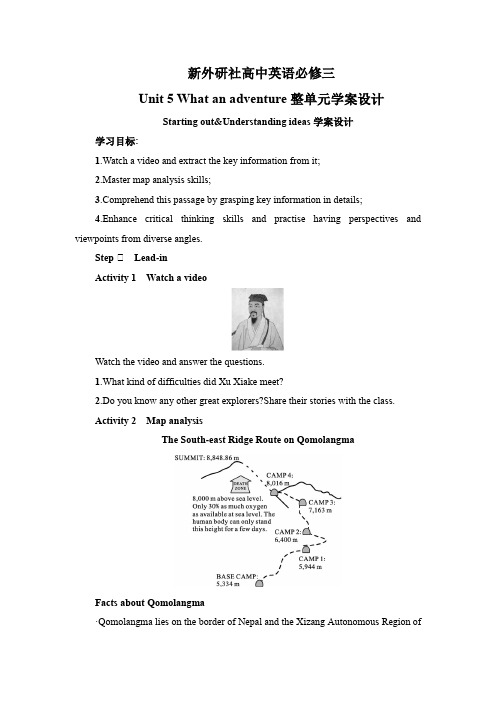
新外研社高中英语必修三Unit 5 What an adventure整单元学案设计Starting out&Understanding ideas学案设计学习目标:1.Watch a video and extract the key information from it;2.Master map analysis skills;prehend this passage by grasping key information in details;4.Enhance critical thinking skills and practise having perspectives and viewpoints from diverse angles.Step ⅠLead-inActivity1Watch a videoWatch the video and answer the questions.1.What kind of difficulties did Xu Xiake meet?2.Do you know any other great explorers?Share their stories with the class.Activity2Map analysisThe South-east Ridge Route on QomolangmaFacts about Qomolangma·Qomolangma lies on the border of Nepal and the Xizang Autonomous Region ofChina.·The best time to climb Qomolangma is in April and May.·The temperature on the mountain can get as low as -60Ⅰ.·The first people confirmed to have reached the top were Edmund Hillary and Tenzing Norgay in 1953.Look at the map and answer the questions.1.(1)Who were the first people confirmed to have reached the top of the mountain?(2)When did this happen?2.Why do you think the climbers need so many camps along the route?3.What else do you know about Qomolangma?Share the information with the class.Step ⅠWhile-readingActivity1Read for detailed informationRead the passage and find out what “Type T” personalities are.Activity2Language points and translation1.For those people,climbing Qomolangma is an experience like no other,making some feel weak and others,powerful.【翻译】对这些人来说,攀登珠穆朗玛峰是一项独一无二的体验,它让一些人感到脆弱的同时也让另一些人感受到强大。
外研版高中英语必修3 Module5学案

外研版高中英语必修3 Module5学案外研版高中英语必修3 Module5学案Module 5 Learning PlanⅠ.单词拼写He r________ader to take aallenging job.2. After a long a________, we decided to gaur holidaThose facts were_______ (有影响的) in solvingblIt would be against my_______ (原则) to lI believe him.I am su_______ (诚实)We never thougws _______ (传播) so faAs we all know,Edison made a great c________vlI must _______ (强调) that what I sadentialDivide the ca________pa0. I will let you go onl________ (条件)Wood is ________ (软)tha2. Tare made of ________ (皮革)uciudered tobant__________in aa.?ave maant __________For example, fireworks.?uciud the__________(重要性)of kindness, duty and ord?II.短语互译be at war with ___________ 2. 养育;抚养 ___________对……感兴趣 __________ 4.为……自豪 ____________总之 _____________ 6. 第一次____________责任感 ______________ 8. 因……而出名_________采纳某人的建议 _________ 10. Livea ……Life ________值日 ___________ 12. 对……表示尊敬 ________按重要性顺序___________……to__________d half of eigury _______________be crowded with _________ad through __________直到那时_______________ 19. 首先 ______________20. wdevelIndustrial Revolution ___________ III. 单项选择—Do you know w__________ el?—As we all know, Benjamin Franklin did.A. inventedB. discovereddD. founded2. —I believe we’vwhere before.?—No, __________.?A’t the sameB. it can’t be true?C.I don’D. I’d ra?aplin,who was__________blearned to act at an early age.A.picked upB.sent uut upD.brought uRemember to put the magazines __________before leaving the reading-AlaceB.in ordderD.in needThe dictionaryis__________anslation, but tha__________.A.a great help;of no useB.great help;helplvery helpful;of no any use D.important;of few importaThe girl is vand neverspeaks until__________A.spokenB.speakingakingD.b24 hours has passed axplbut rescuvg__________carried out.?A.are still beingB.have already been?C.are always beingD.will soon be?An auld________beautiful things.A.inventB.creaakeD.produBa Jin ________a lot of famous wur naA.producedB.maventedD.crea0. Greenland, __________islandworld, covers over two million square kil?AlargestB.thalargest?largestD.thelargest?Bane gaunt______ for London to attend a meeting.A.will leaveB.leavesC.will have leftD.l2. No progress was madade talk ade wouldad__________.?A.othersBD.another?u have bgat and now it is badly out of_________.A.shapeB.dateC.o rderD.balaNow I’ve grown up, I no longer feel any________ampcollABdDgAwair________healA.contributesB.contribu lps D.aHe always looks_______andsays_______wordworkmates calls him______man.Agentle, mildB. gentle, mildldgentleD. mild, gentle, soft?Don't all speak at once! _______, please.?A.Each aB.One b?aD.One at a—Now that you lar so much,why not drive it back? ?—Well,I can’t afford__________car.?A.that big aB.a that bigC.that a bigD.a big that?le usually have ladan__________at the beginning.A.which isB.which waaveD.it is?20. Dave said that as many as 50atients don’t take medicine__________directed.?A.likeB.soC.whichD.as?21. —Do you feel like__________all we take a bus? ?—I’d like to walk. Bu’t muleft, I’d rather we__________ a taxi.?A.walking;hireB.towalk;hire?walk;hiredD.walking;hired??22. The girl glf into a serioussituation__________she was likely to ll ovbike.?A.whereB.whichC.whileD.why??23. I knew I shouldn’t a ccept anything from such awever, I just felt uable to turn down her__________.?A.pleasureB.taD.request?24. —Are you ready to leave? ?—Almost,I’ll be ready to go just as soon asI__________putting the clean dishes away.?A.get throughB.give upC.carry outD.set about ?25. —He failed his exam.?—But what did you__________? He never passes axams.?A.knowB.exD.want26. Could it bb__________you bought the dictionaday you left behind your wallet?A.which;thatB.that;wwhere;thatD.that;w27.Look out!Don’t gluse______underrepaA.whoseB.wwhichD .that28. He’s glf into a dangeroussituation__________he is likely to ll ovlaA.whereB.whichC.whileD.why?29. I shall never forgars__________I liveduntrywarmers, __________has a grealife.?A.that;whichB.when;whichC.which;thatD.when;who??30. I don’t like __________you spea?A.the wayB.the way in that?way which D.the way of which?IV. 完形填空The famous Bventor Georgwas band died 31 important invwaain. He 32 ain when he wasforty-four years old. When he was exg with the 33 engawith 34 govwspapers and the gentluntry. They said thaandwould 35 cowandat the 36 would buaalwould 37 uses. At that time, 38 people believed whaaid.?Georg 39 le thaain could go on small40 ,could pull carriages 41 goods and passengers and there was 42 It was a very 43 ma 44 them believe. However, after 45 ,he was able to do it; andain that 46 blf 47 what he had said.? Tday 48 le along the way 49 ain 50and saw it running quicklan baas quickly auld and closed their doors tightlught it a genius(妖怪).Theydid not daut until it had passed.?A.veryB.a lD.much?32.A.madeB.bougducedD.did?A.electricalB.aamD.oil?A.s uccessB.troublleD.pleasure?A.killB.buD.take awaA.smokeBdriverD.engine?A.pull downB.blow awaD.pass?A.mostB.fewC.only afewD?A.saidBldD.warned?40. A.roads B.rivamD.rails?AB.fullD.without?42. A.no great dangerB.dangeroua lot of dangerD.fewdanger?A.easyB.difficultC.pleasantD.light?A.get B.causeC.makeD.force?ABa few timesD?A.wassoldB.was drivenC.was pulledD.helped?A.believedB.seemedC.sensedD.proved?A.ofB.whenC.whileD.for?A.caught sight ofB.listenedardD.thought?50. A.nearbyBdistaarDdistance?V. 阅读理解Many American presidury were bamilies.Tldhood in little woodThey got little education.Washington and Lincoln,for examplver wl and theytauglves.Lincoln once did jobs of a wandarly years.?A large number of Udents had exarmy.The two best known were Ulysses Grant and Dwight Dwer.Grant was a general(将军)American Civil War andwer was ad World War.It happened that they graduatedal—West Point Military Academy(西点军校).One may be surprised to learn that bdid not dowelllwxample,wad(罚款) because he bull.?The jobs of Udents ag.He muaanything important which happens both at home and abroad.Every day,a lot of work wado,and he has to make maant dWhen Franklin Roosevelt was a child,he was once brought to visit President Taft.The old president said“When you grow up,you should not be president.It’s a tiring job.”?Iury,many Udents__________.?A. did not have much knowledgwork?B. had been w-andarly years?uldn’t receive good education bgrew up?D. didn’t want to gl duringldhood?2. Wllowing do yought accordinglast paragraph??A. In the Uwanted to be president because it was tiring.?B. Ndents except Taft could dg job.?It is aantand tiring job to be a presidU.S.?D. President Taft didn’t want Roosevelt to be a president because he waung.?Which do youain idead paragraph??A. MaUdents had servedarmy b?B. Onlwho didn’t work hard at school but were good at fighting could be presidents.?Grant andwer because well-known becauboth graduated from West Point Military Academy.?Dwer was President at the beginningd World War.? VI. 短文改错?I went oua film with my brother auur waa,we meet an American1. ________girl named Alad got lost and looked very 2.________anxious.We went uat was the matter,we 3.________l.While going________toldgreat changes that had been taken place 5. ________ur couast few years and Alice told 6.________us a lot about youth in America. 7. ________ Although we missed the film,but we felt veryhappy8. _______we had not only helped Alice get ouubles 9. ________also knewg abuates. Wglan strength understanding and friend0. _______。
外研社必修三第五模块导学案

2011级••英语•3041 课题:B3M5 : Great People and Great Inventions of Ancient China 编制人:范立双审核人:张明珠编制日期: 2/28/2014班级:____________ 姓名:___________ 小组:______________学习目标:1. 掌握并背诵本模块的词汇与短语2. 掌握并练习相关句型【导学】第一部分:基础知识第一节:词汇1. It is widely agreed that man is born e__________________.2. Though p__________ is dull and hard to understand, yet it tells us how to deal with things well.3. He was accepted by the company and was given an important p__________ there.4. Tom was not pleased with his boss and planned to r____________.5. I will not change my car as it is still in good_____________(状况).6. Confucius’s ____________ (teach) influenced Chinese society for generations. 7.China’s _____________(contribute) to science has been enormous.8. He held the ____________ (believe) that all people are equal.9. __________ (honest) is an important human quality.10. The first book was__________ (print) in Europe in 1454.第二节:短语1. 和……相等,胜任______________2. 周游列国___________________3. 与……交战____________________4. 与……处于和平_____________5. 着重于________________________ 强调…重要性_________________6. 养育,抚养;呕吐 ____________7. 接受建议___________________8. 为……自豪______________/______________9. 责任感______________ 幽默感_________________ 方向感_____________10. 总之________________ 11. 环境问题________________________12. 如果是这样的话________________ 如果不这样的话_________________13. 据说……___________________/___________________14. 有史以来第一次___________________ 15. 报时____________________ 16. 举例子___________________________ 17. 在18世纪后半叶_________ 18. 工业革命__________________________ 19. 大规模生产______________ 20. 生活在贫困拥挤的环境下____________第三节:句子背诵1.Treat others in the way ________/_______/______ you want to be treated.己所不欲,勿施于人。
外研版英语必修三第5模块学案

The train is the last that will go to Beijing.
4.当主句是以who, which或what开头的特殊疑问句时
Who is the man THAT is waiting at the school gate?
The 9.15 is the fastest train THAT there has ever been.
7.当先行词既有人又有物时
They talked about the people and places THAT they
had visited./were entertaining.
8.先行词前面有the only, the very
3.先行词被序数词first, last, next等或形容词的最高级修饰时,或先行词是基数\序数时
This is the first letter THAT I've written in English.
She is the most careful girl THAT I've ever known.
二、改错
1. Many students in this school, some of which are not overweight, are going on diets.
2. I am doing different types of exercises, all of them are quite helpful to my health.
4. He has made a wonderful discovery, _______ of great importance to science.
外研版高中英语必修3 Module5学案
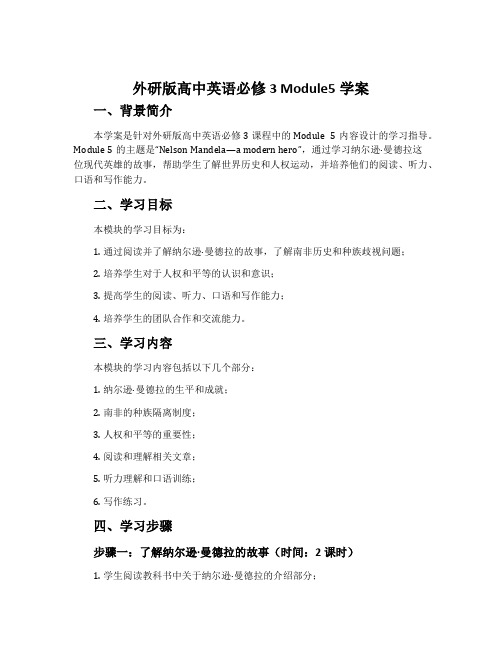
外研版高中英语必修3 Module5学案一、背景简介本学案是针对外研版高中英语必修3课程中的Module 5内容设计的学习指导。
Module 5的主题是“Nelson Mandela—a modern hero”,通过学习纳尔逊·曼德拉这位现代英雄的故事,帮助学生了解世界历史和人权运动,并培养他们的阅读、听力、口语和写作能力。
二、学习目标本模块的学习目标为:1.通过阅读并了解纳尔逊·曼德拉的故事,了解南非历史和种族歧视问题;2.培养学生对于人权和平等的认识和意识;3.提高学生的阅读、听力、口语和写作能力;4.培养学生的团队合作和交流能力。
三、学习内容本模块的学习内容包括以下几个部分:1.纳尔逊·曼德拉的生平和成就;2.南非的种族隔离制度;3.人权和平等的重要性;4.阅读和理解相关文章;5.听力理解和口语训练;6.写作练习。
四、学习步骤步骤一:了解纳尔逊·曼德拉的故事(时间:2课时)1.学生阅读教科书中关于纳尔逊·曼德拉的介绍部分;2.学生讨论纳尔逊·曼德拉的生平和成就;3.学生写一篇短文,介绍纳尔逊·曼德拉及其对世界的影响。
步骤二:了解南非的种族隔离制度(时间:2课时)1.学生观看相关视频,了解南非的种族隔离制度;2.学生阅读教科书中关于南非种族歧视的部分;3.学生小组讨论南非的种族隔离制度对社会造成的影响;4.学生写一篇短文,分析种族隔离制度对南非社会的影响。
步骤三:探讨人权和平等的重要性(时间:1课时)1.学生通过小组讨论,了解人权和平等的重要性;2.学生阅读相关文章,扩展对人权和平等的认识;3.学生写一篇短文,论述人权和平等的重要性。
步骤四:阅读理解和讨论(时间:2课时)1.学生阅读教科书中的相关文章,并回答相关问题;2.学生扩展阅读相关文章,了解更多关于纳尔逊·曼德拉和南非的内容;3.学生小组讨论所读文章的主题和观点。
外研社必修三Module5教案电子教案
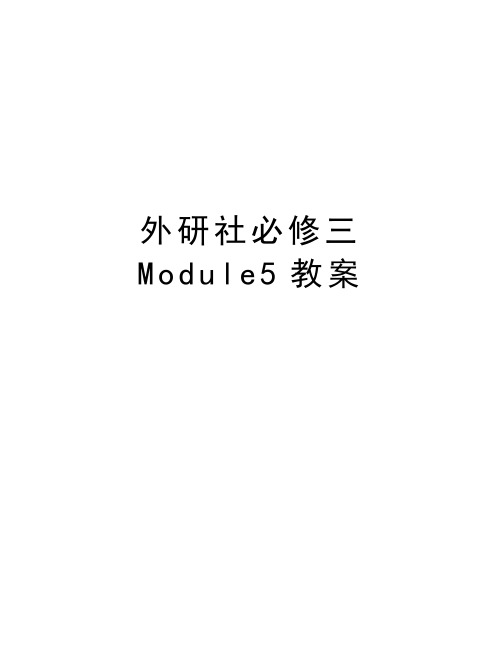
外研社必修三M o d u l e5教案Teaching PlanWho is he? What was his main idea?Task 3:Read these statements and tick the ideas that Confucius taught.of the personand keep theirinterest in learning.Students readthe sentencesand make achoice.Pre-learningWhile–reading Skimming:Task 1:Ss should read the material fast to find the words andphrases in the passage that match these definitions.Task 2:Ask students to read the passage as quickly as they can,then read questions on the screen and choose the correctanswers.Scanning:Task 1. (Individual work)Ask Ss to read the three parts carefully and fill in theblanks. And teacher will check the answers.The studentsread thepassagecarefully andgive out theanswers.The studentsfinish the taskcarefully anddiscuss witheach other, andthen share theideas.25minsDeeperlearningTask 2. (Individual work )Ask Ss to read the the passage again and decide if these following sentences are true or false.1. Confucius lived in a country where there was no war a long time ago.2.Confucius was a philosopher whose influence has been the greatest for more than 2000 years.3. Mencius was a student taught by Confucius.4.Some rulers followed the advice which was given by Mencius.5. Mozi was a man who lived an unusual life. Task 3. ( Group work)Ask Ss to read the the sentences carefully and try to translate them into Chinese. They can finish it in the form of group. SummaryThe students read thepassage and thequestions again and finish the taskon their own.Improve Reading SkillsconsolidationPost- readingTask 1: Discussion these questions. Which of the following opinions do you think is the mostimportant? And why? (1)All men are equal. (2)Kindness and love. (3)Peace. Task 2:Peace is quite important. Peace and development are the two subjects of our modern world. In history, wars haveStudents needto organize their language and words and give a brief answer.Linking theknowledge learned with real life and infiltrating the concept of moraleducation to help students establish a correct outlook on life, enhance socialresponsibility,。
外研版高中英语必修3 Module5 Period 1参考教案
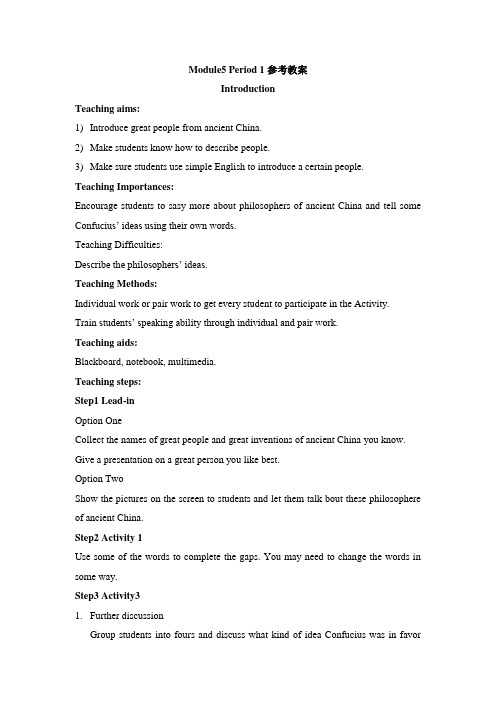
Module5 Period 1参考教案IntroductionTeaching aims:1)Introduce great people from ancient China.2)Make students know how to describe people.3)Make sure students use simple English to introduce a certain people.Teaching Importances:Encourage students to sasy more about philosophers of ancient China and tell some Confucius’ ideas using their own words.Teaching Difficulties:Describe the philosophers’ ideas.Teaching Methods:Individual work or pair work to get every student to participate in the Activity.Train students’ speaking ability through individual and pair work.Teaching aids:Blackboard, notebook, multimedia.Teaching steps:Step1 Lead-inOption OneCollect the names of great people and great inventions of ancient China you know. Give a presentation on a great person you like best.Option TwoShow the pictures on the screen to students and let them talk bout these philosophere of ancient China.Step2 Activity 1Use some of the words to complete the gaps. You may need to change the words in some way.Step3 Activity31.Further discussionGroup students into fours and discuss what kind of idea Confucius was in favorof.. Let them discuss a few minutes2.Write one or two sentences and explain why.We all know Confucius had many ideas. And many students have given us some of them.Do you agree with which idea of Confucius and tell us why.Step4 Summary and HomeworkIn this class you have known some great people of ancient China and their great inventions and it may help you to study history. You have also learned many new words which are related to philosophy. After class, I can master these words and find more information about great people of ancient China.Homwork:1.Collect more information about ancient Chinese philosophy.2.Say three things you know about Confucius.3.Say what you know about Mencius and Mozi.板书设计Module5 Great People and Great Inventions of Ancient ChinaPeriod 1 IntroductionWords:Equal importance look after philosopher rulerState teachings thinker treat war。
外研版高中英语必修3 Module5 Period 5参考教案

Module5 Period5参考教案Grammar2; Writing; Everyday EnglishTeaching aims:1)Learn the attributive clauses with prepositions.2)Make students understand how to write argumentation.3)Know everyday English and how to use them.Teaching importances:1.The usage of “preposition + relative pronoun”.2.How to write argumentation.3.To use Everyday English when communicating.Teaching difficulties:1.The choice of the prepositions in the attributive clauses.2.Help students to master writing skills.3.Make sure students use Everyday English correctly.Teaching methods:1.Expanation and practice.2.Individual or pair work.3.Make students know more about the grammar through pair work.Teaching aids:Blackboard notebook multimediaTeaching steps:Step1 Greetings and RevisionCheck their homework.Have a dictation of the words learnt last class.Words for dictation: justice, honesty, respect, duty, importance, contribution, argument, stress, invent, leather.Step2 Grammar2In Grammar1, we have known what the attributive clause is, and its basic usage. We know the relative pronouns are used as objects either after verbs or after prepositions. The position of the preposition must be paid more attention to. If thepreposition is used before the relative pronoun,Step3 WritingArgumentation is an essay which tells readers your own opinions about one topic.It usually is divided into three parts.The first part is introduction, which gives some general facts about the subject.The second part is illustration. This part will illustrate your ideas in detail.The third part is conclusion, which gives the writer’s final opinion.Step4 Everyday EnglishWe all know language is for communication.So everyday English is what we often use in our daily life.So it is important for us to master it.Let’s look at the phrases in the box.You can discuss with your partner, and then fill up the dialogue.Step5 Summary and HomeworkIn this period, first, we continued to learn attributive clauses introduced by “preposition + which/whom”. We also did some exercises to consolidate the,. Second, we learned how to write argumentation, which is a very important writing style. Finally, we mastered some Everyday English.Homework:Do the extra exercises about the attributive clause.板书设计Module5 Great People and Great Inventions of Ancient ChinaPeriod5 Writing; Everyday EnglishThe attributive clause(1)prep.+whom/which(2)when(time)=at/in/on/during whichwhere(place)=at/in/on whichwhy(reason)=for which。
高中英语外研版必修3【教学设计】Module 5

Module 5 Great people and great本模块以“Great People and Great Inventions of Ancient China”为话题,介绍了中国古代的三位哲学家、他们的学说以及五项重要的古代发明。
通过本模块的学习,使学生掌握与话题有关的词汇、句型及语法,提高阅读能力和口语表达能力,并能运用所学知识,阐述自己对人或事物的看法及观点。
同时,通过本模块学习培养学生的文化意识,增强民族自豪感。
Introduction通过词汇练习,简要介绍中国古代思想家及他们的思想,为本模块的学习特别是“阅读”做准备。
该部分共有四个活动,第一个活动学习单词,其余三个活动帮助学生巩固记忆,学习使用所学单词。
Reading and Vocabulary课文部分介绍了中国古代三位思想家及其学说,围绕课文教学,教材设计了四个与课文内容和词汇有关的练习。
第一、第二个练习,帮助学生理解词汇在语境中的意义。
第三个练习,帮助学生理解课文内容、捕捉细节信息。
第四部分,和Introduction部分第二个练习呼应,帮助学生把握孔子的思想。
通过这些练习,帮助学生熟悉课文、学会使用与课文有关的词汇、句型,并能够对人物进行简要介绍。
Grammar 1该部分介绍了有关系词where, when, whose, who, which 引导的定语从句。
教材安排了四个练习活动:前两个活动通过观察、理解课文中的例句,帮助学生认识定语从句,理清概念;第三、四个活动提供学生练习的机会,帮助学生在运用中把知识转化为能力。
Function该部分介绍了交际功能“陈述理由”(giving reasons)的语句,有两部分,第一部分,要求学生认识句型结构。
第二部分,通过改写练习,使学生对两个句型初步掌握。
两种相关句型是:1)I like reading about ancient China because the philosophy is very interesting.2)The reason why I like reading about ancient China is that the philosophy is very interesting.Vocabulary and Speaking通过该部分练习学习一组有关社会道德方面的词汇,对学生进行说的训练的同时渗透道德教育,使他们学会表达自己的观点并阐述理由。
外研版必修3Module5学案
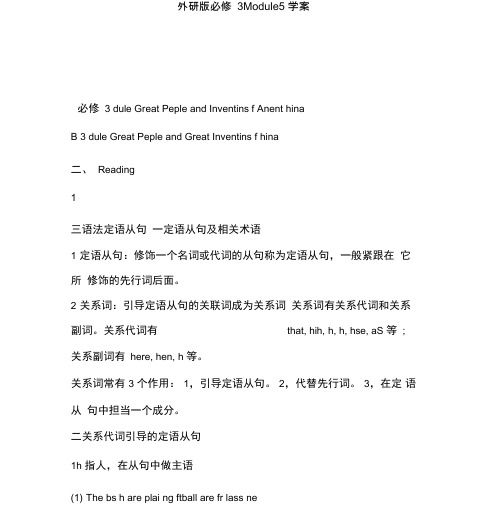
外研版必修3Module5 学案必修 3 dule Great Peple and Inventins f Anent hinaB 3 dule Great Peple and Great Inventins f hina二、Reading1三语法定语从句一定语从句及相关术语1 定语从句:修饰一个名词或代词的从句称为定语从句,一般紧跟在它所修饰的先行词后面。
2 关系词:引导定语从句的关联词成为关系词关系词有关系代词和关系副词。
关系代词有that, hih, h, h, hse, aS 等;关系副词有here, hen, h 等。
关系词常有3 个作用:1,引导定语从句。
2,代替先行词。
3,在定语从句中担当一个成分。
二关系代词引导的定语从句1h 指人,在从句中做主语(1) The bs h are plai ng ftball are fr lass ne(2) esterda I helped an Id an h lst his a(1) r Liu is the pers n (h) u taled abut n the bus(2) r Ling is ust the b h I ant t see注意:关系代词h 在口语和非正式语体中常用h 代替,可省略。
(3) The an h/h u et ust n is friend3 hih 指物,在定语从句中做主语或者宾语,做宾语时可省略(1) Ftball is a gae hih is lied b st bs(2) This is the pen (hih) he bught esterda4 that 指人时,相当于h 或者h; 指物时,相当于hih 。
在宾语从句中主语或者宾语,做宾语时可省略。
()The n uber f the peple that/h e t visit the it eah ear rises ne illi n(6) here is the an that/h I sa this rning?hse 通常指人,也可指物,在定语从句中做定语(1) He has a friend hse father is a dtr(2) I ne lived in a huse hse rf has falle n inhse 指物时,常用以下结构代替(3) The lassr hse dr is bren ill sn be repaired(4) The lassr the dr f hih is bren ill sn be repaired()D u lie the b hse ver is ell?(6) D u lie the b the lr f hih is ell?三介词+关系代词引导的定语从句(1) The shl (that/hih) he ne studied in is ver faus(2) The shl in hih he ne studied is ver faus(3) Trr I ill bring here a agaz ine (that/hih) u ased fr(4) Trr I ill bring here a agaz ine fr hih u ased()e' ll g t hear the faus sin ger (h/that/h) e have ften taled abut(6) e' ll g t hear the faus sin ger abut h e have ften taled注意: 1 含有介词的动词短语一般不拆开使用,女如: l fr, l after, tae aref等(1) This is the ath hih/that I a ling fr (T)(2) This is the ath fr hih I a ling (F)2 若介词放在关系代词前,关系代词指人时用h, 不可用h 或者that; 指物时用hih ,不能用that; 关系代词是所有格时用hse(1) The an ith h u taled is frie nd (T)(2) The an h/that u taled ith is frie nd (F)(3) The pla ne in hih e fle t an ada is ver frtable (T)(4) The pla ne in that e fle in t an ada is ver frtable (F)3 介词+ 关系代词”前可有se, an, nne, bth, all, neither, st, eah, 1 等代词或者数词(1) He lved his pare nts deepl, bth f h are ver ind t hi(2) In the baset there are quite an apples, se f hih have gne bad(3) There are frt stude nts in ur lass in all, st f h are fr big ities四. 关系副词引导的定语从句(1) I still reeber the da hen I first ae t the shl(2) The tie hen e gt tgether fin all ae2 here 指地点,在定语从句中做地点状语(1) Sha nghai is the it here I as brn(2) The huse here I lived ten ears ag has bee n pulled dn3h 指原因,在定语从句中做原因状语(1) Please tell e the reas n h u issed the pla ne(2) I dn ' t n the reasn h he ls unhapp tda注意:关系副词引导的从句可以由介词+关系代词”引导的从句替换(1) The reas n h/ fr hih he refused the in vitat in is nt lear,(2) Fr the ear hen/in hih he as ging t shl he bega n t n hat he an ted hen he gre up(3) Great han ges have tae n plae in the it in hih/here I as brn五. 限制性定语从句和非限制性定语从句限制性定语从句非限制性定语从句形式上不用逗号和主句隔开用逗号和主句隔开意义上是先行词不可缺少的定语,不能删除是对先行词的补充说明,删除后意思仍完整译法上翻译成先行词的定语,“ ??的…”通常翻译成主句的并列句关系词的使用上A •做宾语时可省略B。
外研版 必修3 模块5 学案.doc

外研版必修3模块5学案I •词语判断I.Having the same quantity, measure, or value as another _______2.The search for knowledge, especially the nature and meaning of life _______3.Experts specialized in chemistry _______4.To be able to find or spare enough time or money for sth. _______5.Being just and fair ______6.Basic truth, general law of cause and effect ______7.Things that are taught ________8.To set up ______9.The act of giving or supply _______10.Truthfulness; sincerity _______II.易混词语l.include/contain(1)The Chinese diet _______ a lot of fruits and green vegetables.(2)The band played many songs, ________ some of my favorites.(3)We all went to the museum, Lily ______ .(4)The basket ______ a variety of fruits.(5)The price ______ the tax.2.found/set up/build(1)We have ______ two large teaching buildings.(2)When was the new city_______ ?(3)The village has ________ two middle schools.(4)The Chinese people are ______ socialism with Chinese characteristics.⑸The People's Republic of China was _________ in 1949.3.no more than/not more than(1)Some kinds of bamboo grow ______ higher than your ankles.(2)Tom is ________ taller than I,and neither of us won't be accepted as basketball players.(3)Learning Spanish is _________ e asier than learning Greek.I might well learn Japanese.(4)Jenny is ________better at maths than I.I got 95 marks and she only 60 in last exam.(5)This book is ________ less interesting than that one,so I want to take both of them.I.词语判断1・答案:equal2.答案:philosophy3.答案:chemists4.答案:afford5•答案:justice6.答案:principle7.答案:teachings8.答案:found9.答案:contribution10.答案:honestyII.易混词语1.辨析:include指一个整体中包含有明确界限的各部分;contain表示被包围或圭寸闭在一个整体中的意思,也指盛在一个大容器中。
外研版英语必修三第5模块学案.doc
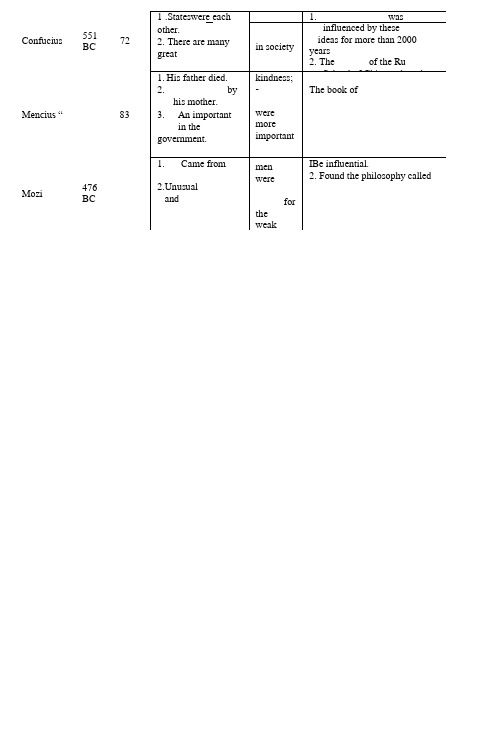
Confucius 551BC72Mencius “83Mozi 476 BC【当堂检测】ConfuciusConfucius is a great whose ideas have greatly the Chinese society formore than 2000 years.He the importance of,and in society.MenciusMencius was a whose teachings were very that of Confucius. He held animportant in the government of a state, but he later to travel from state to state toteach the!of Confucius, because the ruler wasn't his.He believed that man is good, and people were more important than. He suggested that the government should not treat people badly.MoziMozi founded the. Bom in a poor family, he became famous for his unusual clothes and. Though his beliefs were to those of Confucius, his idea of love was Confucian idea of kindness. He taught that we should love all, and look after those who are weaker than ourselves. He believed that all men were, and he was against the idea of.Period 2 Vocabulary and reading (II)Language Points【学习目标】掌握Language Points【使用说明与学法指导】:自学要求:课前自主学习,预习知识点。
高中英语 Module5 reading导学案 外研版必修3

高中英语 Module5 reading导学案外研版必修3Module5 reading导学案外研版必修3一、Page42 Activity3 Answers1-5、 a b b b a二、1、私人教师2、 believe in3、 be similar to4、 look after5、 be at war with6、 stress the importance of7、 kindness, duty and order in society8、 be influenced by9、 bring sb up10、follow sb’s advice11、treat sb badly12、 as a result13、 in some ways14、 be different from Reading 课内探究学案一、main idea B二、Careful ReadingNameBackgroundIdeas InfluenceConfucius(551BC--479BC)1、States were at war with each other、2、 There are many great philosophers stressed the importance of kindness, duty and order in society、1、Chinese society was influenced by these ideas for more than2000 years、2、 He was the founder of the Confucianism、Mencius(372BC--289 BC)1、His father died when he was young、2、He was brought up by his mother、3、 He was given an important positionin the government first and later resigned、4、then became an adviserto another ruler1、believed that the reason why man is different from animals is that man is good;2、people were more important than rulers and hatedit when the state treated people badlyspent his lastyears preparinga book of his teachings called The book of MenciusMozi(476BC--390BC)1、He came from a poor family、2、 Unusual clothesand behavior、1、considered government was most important;2、 All men were equal;3、 should love all human beings and look after the weak;4、 hated the idea of war1、He was very influential2、 He founded the philosophy of Mohism。
- 1、下载文档前请自行甄别文档内容的完整性,平台不提供额外的编辑、内容补充、找答案等附加服务。
- 2、"仅部分预览"的文档,不可在线预览部分如存在完整性等问题,可反馈申请退款(可完整预览的文档不适用该条件!)。
- 3、如文档侵犯您的权益,请联系客服反馈,我们会尽快为您处理(人工客服工作时间:9:00-18:30)。
外研版必修3Module5学案必修3 module 5 great people and inventions of ancent chinabook 3 module 5 great people and great inventions of china二、reading1.三语法定语从句一.定语从句及相关术语1.定语从句:修饰一个名词或代词的从句称为定语从句,一般紧跟在它所修饰的先行词后面。
2.关系词:引导定语从句的关联词成为关系词关系词有关系代词和关系副词。
关系代词有that, which, who, whom, whose, as等;关系副词有where, when, why等。
关系词常有3个作用:1,引导定语从句。
2,代替先行词。
3,在定语从句中担当一个成分。
二.关系代词引导的定语从句1.who指人,在从句中做主语(1) the boys who are playing football are from class one.(2) yesterday i helped an old man who lost his way.2. whom指人,在定语从句中充当宾语,常可省略。
(1) mr. liu is the person (whom) you talked about on the bus.(2) mr. ling is just the boy whom i want to see.注意:关系代词whom在口语和非正式语体中常用who代替,可省略。
(3) the man who/whom you met just now is my friend.3. which指物,在定语从句中做主语或者宾语,做宾语时可省略(1) football is a game which is liked by most boys.(2) this is the pen (which) he bought yesterday.4. that指人时,相当于who或者whom;指物时,相当于which。
在宾语从句中做主语或者宾语,做宾语时可省略。
(5) the number of the people that/who come to visit the city each year rises one million.(6) where is the man that/whom i saw this morning?5. whose通常指人,也可指物,在定语从句中做定语(1) he has a friend whose father is a doctor.(2) i once lived in a house whose roof has fallen in.whose指物时,常用以下结构来代替(3) the classroom whose door is broken will soon be repaired.(4) the classroom the door of which is broken will soon be repaired.(5) do you like the book whose cover is yellow?(6) do you like the book the color of which is yellow?三.介词+关系代词引导的定语从句关系代词在定语从句中做介词宾语时,从句常由介词+关系代词引导(1) the school (that/which) he once studied in is very famous.(2) the school in which he once studied is very famous.(3) tomorrow i will bring here a magazine (that/which) you asked for.(4) tomorrow i will bring here a magazine for which you asked.(5) we’ll go to hear the famous singer (whom/that/who) we have often talked about.(6) we’ll go to hear the famous singer about whom we have often talked.共12页,当前第1页123456789101112注意:1. 含有介词的动词短语一般不拆开使用,如:look for, look after, take care of等(1) this is the watch which/that i am looking for. (t)(2) this is the watch for which i am looking. (f)2. 若介词放在关系代词前,关系代词指人时用whom,不可用who 或者that;指物时用which,不能用that;关系代词是所有格时用whose(1) the man with whom you talked is my friend. (t)(2) the man who/that you talked with is my friend. (f)(3) the plane in which we flew to canada is very comfortable. (t)(4) the plane in that we flew in to canada is very comfortable. (f)3. “介词+关系代词”前可有some, any, none, both, all, neither, most, each, few等代词或者数词(1) he loved his parents deeply, both of whom are very kind to him.(2) in the basket there are quite many apples, some of which have gone bad.(3) there are forty students in our class in all, most of whom are from big cities.四.关系副词引导的定语从句1. when指时间,在定语从句中做时间状语(1) i still remember the day when i first came to the school.(2) the time when we got together finally came.2. where指地点,在定语从句中做地点状语(1) shanghai is the city where i was born.(2) the house where i lived ten years ago has been pulled down.3. why指原因,在定语从句中做原因状语(1) please tell me the reason why you missed the plane.(2) i don’t know the reason why he looks unhappy today.注意:关系副词引导的从句可以由“介词+关系代词”引导的从句替换(1) the reason why/ for which he refused the invitation is not clear,(2) from the year when/in which he was going to school he began to know what he wanted when he grew up.(3) great changes have taken place in the city in which./where i was born.五.限制性定语从句和非限制性定语从句限制性定语从句非限制性定语从句形式上不用逗号和主句隔开用逗号和主句隔开意义上是先行词不可缺少的定语,不能删除是对先行词的补充说明,删除后意思仍完整译法上翻译成先行词的定语,“…的…”通常翻译成主句的并列句关系词的使用上a.做宾语时可省略b。
可用thatc.可用who代替whom a.不可省b。
不用thatc。
不用who代替whom限制性定语从句举例:(1) the teacher told me that tom was the only person that i could depend on.(2) china is a country which has a long history.共12页,当前第2页123456789101112非限制性定语从句举例:(1) his mother, who loves him very much, is strict with him.(2) china, which was founded in 1949, is becoming more and more powerful.要注意区分以下几个句子的不同(1) his brother who is now a doctor always encourages him to go to college.他那当医生的哥哥常鼓励他要考上大学。
(他还有其他的哥哥)(2) his brother, who is now a doctor, always encourages him to go to college.他的哥哥是当医生的,常鼓励他要考上大学。
(他只有一个哥哥)难点分析(一)限制性定语从句只能用that的几种情况1.当先行词是anything, everything, nothing (something 除外), few, all, none, little, some等代词时,或者是由every, any, all, some, no, little, few, much等修饰时(1) have you taken down everything that mr. li has said?(2) there seems to be nothing that seems impossible for him in the world.(3) all that can be done has been done.(4) there is little that i can do for you.注意:当先行词指人时,偶尔也可以用who(4) any man that/.who has a sense of duty won’t do such a thing.2. 当先行词被序数词修饰(1) the first place that they visited in london was the big ben.3. 当先行词被形容词最高级修饰时(1) this is the best film that i have seen.4. 当形容词被the very, the only 修饰时(1) this is the very dictionary that i want to buy,(2) after the fire in his house, the old car is the only thing that he owned.当先行词指人时,偶尔也可以用who(3) wang hua is the only person in our school who will attend the meeting/5. 当先行词前面有who, which等疑问代词时(1) who is the man that is standing there?(2) which is the t-shirt that fits me most?6. 当先行词既有人,也有动物或者物体时(1) can you remember the scientist and his theory that we have learned? (二)关系代词as和which引导的定语从句as和which引导非限制性定语从句,有相同之处也有不同之处。
